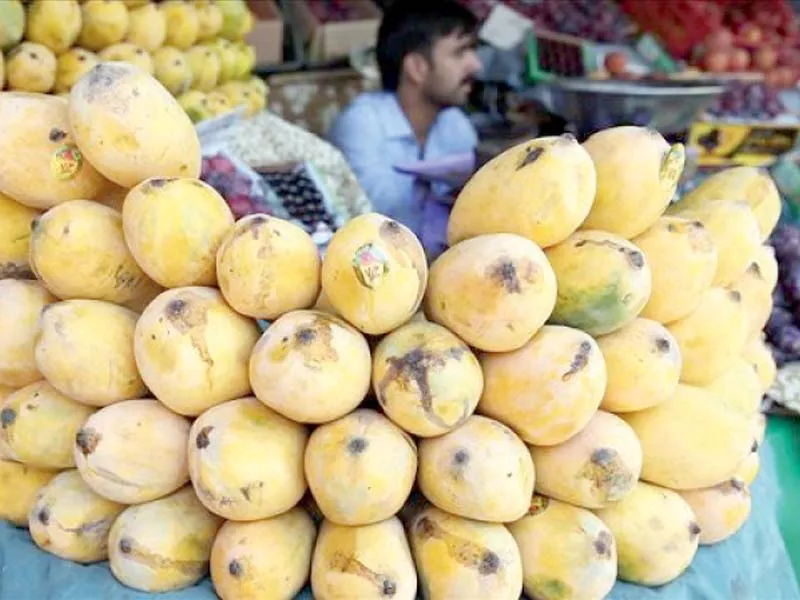Mango exports ‘hugely’ hit
Halt to international flights, rising freight fares add to Pakistani exporters’ woes
KARACHI: Pakistan’s traditional mango exports will take a hit from the economic havoc wreaked by the coronavirus pandemic as exporters fear a huge decline in export of the fruit this year.Suspension of international flights, closure of borders, rising freight fares, and on top of all, contracting demand together are likely to push down the country’s mango exports by 35% to 40% this year.
Last year, Pakistan exported 130,000 tons of mangoes to the Middle East, Europe, the US, Japan, Australia and other countries.
This year, however, according to Waheed Ahmed, a leading fruit exporter and Patron-in-chief of Pakistan Fruit and Vegetable Exporters Association, the country is expected to export not more than 80,000 tons of mangoes.
“Pakistan had earned over $90 million through mango exports alone but it will not be more than $50 million this year due to the present coronavirus conditions,” Ahmed told Anadolu Agency.
“Timing is a key factor vis-a-vis mango exports as it is a perishable commodity. It cannot wait long,” he said, adding, “Suspension of international flights has badly hit mango exports to Europe and the US.”
“Many exporters are sending mangoes to Europe and the US via cargo flights but their charges have increased four times,” he added.
Closure of borders with neighbouring Iran and Afghanistan has also been a factor in the decline in mango exports. The two countries together import 30,000 to 35,000 tons of mangoes annually.
“Mango exports to the Middle East are continuing via sea route but demand is not that high as tens of thousands of Pakistanis and other South Asians have returned to their countries [from Gulf states], while a large number of people have lost their jobs,” he maintained.
Cost of production rises
Mahmood Nawaz Shah, a grower from southern Sindh province, the second largest mango-producing province after northeastern Punjab, echoed Ahmed’s views.
“The overall mango exports will be lesser this year due to Covid-19-related restrictions, mainly closure of international flights, and a huge increase in freight rates,” Shah told Anadolu Agency.
Cost of production, he went on to say, also increased due to implementation of Covid-19 safety guidelines.
The country has reported around 76,400 confirmed cases of the virus and 1,621 deaths so far.
Pakistan, last week, partially lifted a prolonged ban on international flights, which Shah thought, would provide relief for mango exporters.
“This will certainly have a positive impact because at least access will be available,” he observed. “But I don’t see a huge difference because airlines are not going to reduce the freight rates,” he added.
Ahmed too sees a little impact of the resumption of flights on mango exports. “I don’t see a major impact on [mango] exports because there is no decrease in freight rates.”
Less production
Until 2018, Pakistan produced 1.9 million tons of mangoes annually, thus ranking sixth in the world, followed by India, China, Thailand, Indonesia and Mexico. There are two-dozen mango varieties, notably Anwar Rataul, Daseri, Langra, Saroli, Sindhri, Totapari and others.
But the taste of the country is the prized Chaunsa, which accounts for 60% of total mango exports.
Despite the aroma and taste that makes Pakistani mangoes a hot favourite, little attention is being paid to adopt latest harvesting practices to improve their quality further.
The country’s mango production has declined over the past four years, a phenomenon blamed on global warming.
Pakistan’s actual production capacity of 1.9 million tons decreased to 1.4 million tons last year, and is likely to stand the same this year also, according to Ahmed.
“Mango crops require hot weather but winters are going longer and longer every passing year, which is gradually affecting mango production,” he said.
This year, Ahmed said, the mango crop is two-week late due to delayed summer.
Published in The Express Tribune, June 3rd, 2020.
Like Business on Facebook, follow @TribuneBiz on Twitter to stay informed and join in the conversation.


COMMENTS
Comments are moderated and generally will be posted if they are on-topic and not abusive.
For more information, please see our Comments FAQ